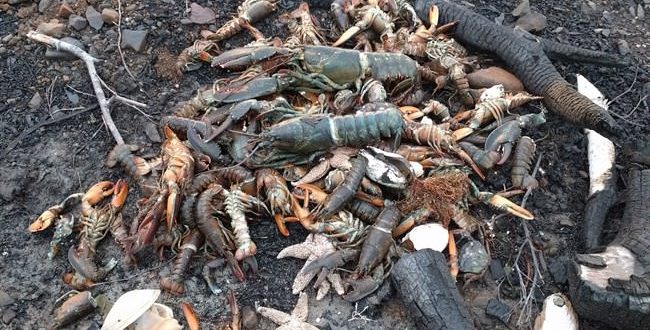The carcasses of thousands of sea creatures have mysteriously washed up on the western coast of Nova Scotia.
Normally, you’d expect a particular sickness to affect only one species of marine life, retired veterinary pathologist Ted Leighton told the CBC. Whatever this is, it seems almost indiscriminate.
“What we know is that around one spot a large number of species that aren’t closely connected are all dead,” Leighton told the Chronicle Herald in an interview. “But almost all are invertebrates living at the bottom of the ocean, a habitat they share.”
Observers have speculated that the cause of the mass deaths might be the gigantic underwater turbine that was installed in the nearby Bay of Fundy in November. The goal is to harvest the power of the bay’s legendary tides to generate electricity. The risk of harm to local wildlife was so concerning that local fishers took their case to court in an attempt to halt construction. They lost.
But the Chronicle Herald notes that the turbine is a good 100 kilometres away from the sites where marine life has been washing up, and they’re not showing any signs of being chewed up by the turbine’s massive rotors. Researchers, including Leighton, are also urging caution in jumping to conclusions about the cause of the deaths.
Until researchers can determine what’s going on in Nova Scotia, it’s another marine mystery in a country that’s starting to eerily resemble an episode of the X-Files.
Herring found by DFO C&P Officers in Southwest Nova Scotia yesterday was not fresh (4-5 days old) pic.twitter.com/CyQzxwxQrH
— DFO Maritimes (@DFO_MAR) December 29, 2016
Just this year, mass fish deaths were reported in Florida’s Indian River Lagoon and Hongcheng Lake in Haikou,China.
In Florida, dead fish blanketed the Atlantic coast for miles in March. The deaths were caused by a combination of environmental factors. Warmer waters, increased precipitation and pollutant runoff made way for toxic algae blooms and brown tide, ultimately depleting the water of oxygen.
In China, an estimated 35 tons of fish died at Hongcheng Lake in May. While residents blamed the fish kill on pollution, local authorities attributed the incident to changes in salt levels.
Agencies/Canadajournal
 Canada Journal – News of the World Articles and videos to bring you the biggest Canadian news stories from across the country every day
Canada Journal – News of the World Articles and videos to bring you the biggest Canadian news stories from across the country every day




How much toxic discharge did the province of Quebec dump into the St Lawrence?And what is at the end of the St Lawrence?Hmmm, Not rocket science people.Pacific ocean is irradiated and the Atlantic ocean is a toxic dump site.I weep for the future.